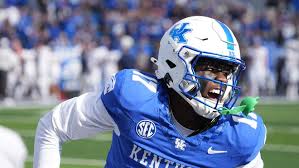Former Kentucky football coach Hal Mumme is officially back on the college sidelines, marking a surprising return to the game he helped transform.
Hal Mumme’s name has long echoed through the corridors of college football lore, whispered in reverence by offensive minds and repeated with curiosity by those who’ve studied the evolution of the passing game. For years, he was the eccentric innovator, the man behind the curtain who pulled the strings on the air raid revolution. His time at Kentucky in the late 1990s helped shift the landscape of offensive strategy, opening the door for pass-heavy systems to find legitimacy in a game long dominated by ground-and-pound traditions. Now, after years away from the frontlines, Hal Mumme has returned to where he belongs—on a college football sideline—and the timing couldn’t feel more poetic.
Mumme’s reappearance on the coaching scene isn’t just a nostalgic footnote or a ceremonial gesture. It signals something deeper. Football, like any great institution, has a tendency to circle back to its true north. In this case, that magnetic pull is the belief that the passing game should be liberated, not restricted. That players should be placed in space and given freedom to improvise and create. That tempo matters. That unpredictability is power. These are the ideals Mumme championed long before they were cool. And now, as college football once again stands at a crossroads—with player compensation, transfer mobility, and technological innovation redefining the game—Mumme’s presence offers something rare: continuity amid chaos.
During his original stint at Kentucky from 1997 to 2000, Mumme introduced the Southeastern Conference to an up-tempo, pass-first system that left many of his peers confused and occasionally embarrassed. While his overall record in Lexington may not have cemented him as a household winner, his influence was undeniable. Quarterbacks flourished under his watch. One of the most famous, Tim Couch, was drafted No. 1 overall in the 1999 NFL Draft after throwing for 8,435 yards in two seasons with Mumme at the helm. Those numbers might seem commonplace now in an era defined by video-game stats, but at the time, they were revolutionary. SEC defenses, built to stop the run, were routinely shredded through the air. It wasn’t just new—it was radical.
Mumme didn’t merely win games; he started a movement. The air raid spread like wildfire across the country. His coaching tree includes household names such as Mike Leach, Dana Holgorsen, Kliff Kingsbury, Lincoln Riley, and countless others who adapted, borrowed, or outright copied the principles Mumme once sketched on a napkin. While others refined or modernized the scheme, it was Mumme’s imagination that laid the foundation. And now, that same imagination is back in business.
There’s something poetic about a return like this one. Time has a way of mythologizing figures like Mumme. The grizzled tactician, once laughed at for throwing the ball 50 times a game in a league known for three yards and a cloud of dust, is now hailed as a prophet who saw the future before anyone else. In recent years, he’s floated on the outskirts of the football world—consulting, mentoring, guest speaking. Always respected, but often viewed as yesterday’s genius in a game sprinting toward tomorrow. But perhaps the game never really outgrew him. Perhaps it just needed time to appreciate what he represented.
Mumme’s return isn’t just about X’s and O’s. It’s also about legacy, influence, and the enduring power of ideas. The game has changed drastically since the days he stood on the Kentucky sideline, headset on, clipboard in hand, barking out play calls that defied logic but lit up scoreboards. Today’s offenses borrow heavily from his framework, but there’s something to be said for the originator stepping back into the fire. It’s a reminder that ideas don’t die when the whistle blows. They evolve, and their architects remain relevant so long as they can adapt.
What makes this comeback even more intriguing is the context. Mumme is not simply returning to relive the past; he’s walking into a world vastly different from the one he once dominated. The transfer portal has turned rosters into revolving doors. Name, Image, and Likeness (NIL) has forever altered the recruiting landscape. Analytics now guide everything from fourth-down decisions to practice workloads. Drones hover over practices. Quarterbacks wear wristbands with plays downloaded from iPads. The old-school grit is still there, but it’s surrounded by bells and whistles that didn’t exist during his prime.
Yet, for all these changes, the core remains the same. Football is still about mismatches, timing, rhythm, deception, and execution. And few understand those fundamentals better than Mumme. He doesn’t need to be the loudest voice in the room anymore. He just needs to be the sharpest. With decades of experience and a playbook that once turned football upside down, he has all the tools to make an impact again. Young players, many of whom were born after his Kentucky days, will now get to learn directly from the man whose offensive vision helped shape the game they grew up watching.
It’s not lost on many that Hal Mumme has always embraced being an outsider. He never cared much for conventions or traditions. He wore shorts in cold weather. He once called plays from the press box in flip-flops. His press conferences could veer from football strategy to philosophy with little warning. That same irreverent spirit makes his return all the more refreshing. He doesn’t want to fit in. He wants to disrupt. Again.
There are, of course, skeptics. Some will question whether a coach who hasn’t held a major head coaching job in years can still connect with modern players or handle the frenetic pace of today’s game. But those doubts are nothing new for Mumme. He’s faced resistance his entire career. He’s been dismissed, underestimated, even mocked. And yet, time and time again, his ideas have outlived the criticisms. If history is any guide, it would be foolish to bet against him now.
What his new role entails exactly remains to be seen. Whether he’s leading a program, coordinating an offense, or simply serving as a mentor to younger coaches, his fingerprints will be felt. The true measure of his impact won’t just be in wins and losses. It’ll be in the subtle tweaks to offensive philosophies, the confidence he instills in quarterbacks, and the creativity he inspires in assistants who grew up idolizing him.
For fans of Kentucky football, the news of Mumme’s return to the sidelines stirs up memories of a different time. A time when Commonwealth Stadium was filled with the buzz of anticipation every Saturday. When the ball flew through the air with frequency and flair. When no lead felt safe and every game felt like a shootout waiting to happen. Even though his return isn’t in Lexington, the legacy he left there continues to ripple through the sport.
It’s not often that a coach can leave a lasting imprint on the fabric of the game without a national title or a Hall of Fame résumé. But Mumme did just that. He proved that impact isn’t always measured in trophies. Sometimes it’s measured in influence, in boldness, in the number of playbooks your ideas sneak into. That’s the kind of immortality Mumme earned. And now, with this latest chapter unfolding, he has a chance to add to it.
As he steps back onto the sideline, headset secured, eyes scanning the field, Hal Mumme isn’t chasing a comeback. He’s continuing a mission. A mission to challenge norms, to empower quarterbacks, to stretch defenses, and to never stop throwing. Because to him, football was never just a game. It was a canvas. And the air raid offense was his brush. Now, after years in the background, he’s ready to paint again.



